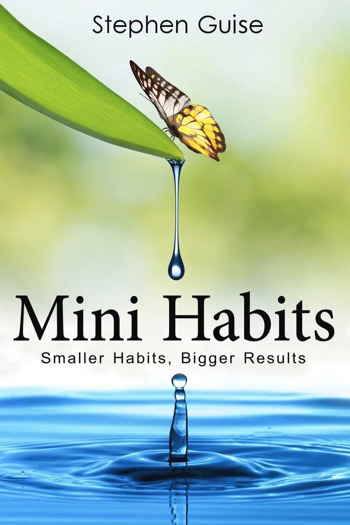 Mini Habits by Stephen Guise is the book I’ve been writing in my head for years. Well, almost. It’s about intentionally forming good habits by setting the bar really, really low.
Mini Habits by Stephen Guise is the book I’ve been writing in my head for years. Well, almost. It’s about intentionally forming good habits by setting the bar really, really low.
Mini-Habits is a highly practical book. Unlike The Power of Habit, for example, which spends a lot of time putting a biological foundation under it’s habit forming recommendations, Mini-Habits goes almost right into how to start forming good habits. It just so happens that I can confirm the effectiveness of Guise’s method—they worked for me, and I thought they were my idea! But many people are hesitant to even believe habits are a real physiological process, so I think some people will read this book and be convinced it cannot work for them. Or that it’s too simple to be taken seriously.
Doing the same thing repetitiously for a long time creates neural pathways, kind of like water forming a river bed. Once the riverbed is formed, water that enters it will always flow along that path because it requires no energy. If you wanted to make a new river bed, you would need to direct the water somewhere else and let it wear the rock away again—or dig one out yourself. Fortunately, there’s no way to directly build a new neural pathway. We have to do it slowly, until that new pathway is the easiest route our mind can take.
Most habit books, including The Power of Habit, while informative, prescribe a method for forming habits that most people probably aren’t going to be successful with. Either because they run out of willpower (yes, it’s a depletable resource), or because they aren’t self observant enough to be able to identify their cues. Mini-Habits on the other hand, comes with minimum benefits that are almost nothing at all, but made up for many times over by the near impossibility of failure.
Guise (and my) method could be summed up like this: Set the bar so low you can’t fail, but do it every single day no matter what.
This works for two main reasons. First, to make yourself do the absolute minimum of something takes very little willpower, and thus even if it’s an afterthought and it only takes you two seconds to do, you register success for the day and you strengthen the seed of a new neurological pathway. And second, motivation often follows the first step. Sometimes if you start, you find you want to keep going. Starting is half the battle, they say.
In Guise’s example, he built a habit of exercise out of doing just one pushup a day. But, since Guise’s method lines up so closely with what I’ve been practicing the last few years, I’ll use my example. I also wanted to get more exercise. Specifically, I wanted to get my heart rate up at least once a day. So I started with 1 minute of jump rope every day. Every day no matter what—whether it was cold, raining, I was sick, tired, sad, busy, traveling, whatever. I promised myself I would find 1 minute every day and I put a recurring daily to-do which read: “work out anything as much as you want”.
Sticking with it was really easy. As out of shape as I was, one minute was just enough to make me feel like I did something, but not enough to make me dread it the next morning. Before long though, one minute of jump rope was easy. Like really easy, barely moving my heart rate past 80bpm. So I added another minute. Again, it got easy. So I added another minute. Again and again. Now I’m up to about 7 minutes of cardio vascular activity every morning, and 10 or 15 push ups. But the to-do that comes up still says the same thing: “work out anything as much as you want”.
Every so often I have to cut my workout short, but that’s okay. A fundamental part of the method is just about nurturing a positive repetitious action—getting some benefit is vastly better than no benefit. So anything I do counts, the habit is strengthened and the likelihood that I’ll get even more exercise more frequently goes way up.
This same method has proven itself in other places for me too. For example, my to-do list functions much the same way. My to-do list has become a habit because I tend to it every day. Every day I at least touch on every one of my to-dos. If all I can do is add one word to a document I’m working on, that’s fine. If I can only read five pages of the book I’m into, or complete just one little lesson on Codecademy, it’s fine. I can check it off and make a new to-do for the remainder of the task. The result is that most days, I finish everything on the list with little resistance. My to-do list is a habit.
Knowing how to reliably develop habits has another important benefit—your brain’s habit system is foundational to self-discipline. And self-discipline is the most important factor in success at pretty much anything you intend to do. If you have to be disciplined to write for a blog, become punctual, learn something new, or whatever—it’s largely a matter of figuring out which habits you should form and this minified habits method provides a virtual no-failure way to get there.
Mini Habits is an excellent book, and was fairly simple to read. Each section cost about 15 minutes, and stays comfortably practical throughout. I’m a touch relieved that Guise wrote this book, since now I won’t have to. I expect I’ll be recommending this one to a lot of people.

Recent Discussion